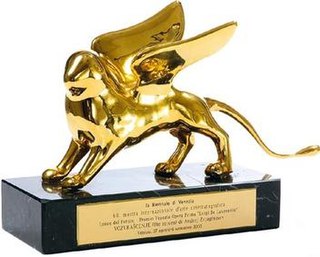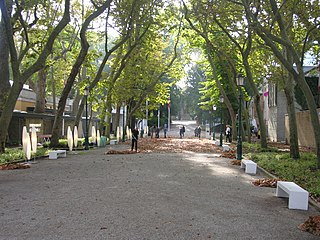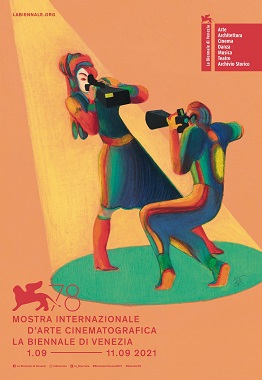
The Venice Film Festival or Venice International Film Festival is an annual film festival held in Venice, Italy. It is the world's oldest film festival and one of the "Big Five" International film festivals worldwide, which include the Big Three European Film Festivals, alongside the Toronto Film Festival in Canada and the Sundance Film Festival in the United States. The Festivals are internationally acclaimed for giving creators the artistic freedom to express themselves through film. In 1951, FIAPF formally accredited the festival.

The Venice Biennale is an international cultural exhibition hosted annually in Venice, Italy by the Biennale Foundation. The biennale has been organised every year since 1895, which makes it the oldest of its kind. The main exhibition held in Castello, in the halls of the Arsenale and Biennale Gardens, alternates between art and architecture. The other events hosted by the Foundation—spanning theatre, music, and dance—are held annually in various parts of Venice, whereas the Venice Film Festival takes place at the Lido.

The Golden Lion is the highest prize given to a film at the Venice Film Festival. The prize was introduced in 1949 by the organizing committee and is now regarded as one of the film industry's most prestigious and distinguished prizes. In 1970, a second Golden Lion was introduced; this is an honorary award for people who have made an important contribution to cinema.

The Venice Giardini or Giardini della Biennale is an area of parkland in the historic city of Venice which hosts the Venice Biennale Art Festival, a major part of the city's cultural Biennale. The gardens were created by Napoleon Bonaparte who drained an area of marshland in order to create a public garden on the banks of the Bacino di San Marco which is a narrow stretch of water dividing the gardens from St. Mark's Square and the Doge's Palace.

The Volpi Cup for Best Actress is an award presented by the Venice Film Festival. It is given by the festival jury in honor of an actress who has delivered an outstanding performance from the films in the competition slate. It is named in honor of Count Giuseppe Volpi di Misurata, the founder of the festival. The 1st ceremony was held in 1932, when Helen Hayes received the Volpi Cup for the title role in The Sin of Madelon Claudet (1931)—this was the only time that the award was chosen by public voting. From 1942 to 1945, the festival was suspended because of World War II. The student protests in May 1968 opened a period of institutional changes, with no prizes were awarded from 1969 to 1979.

The 69th annual Venice International Film Festival, organized by Venice Biennale, took place at Venice Lido from 29 August to 8 September 2012. The festival opened with the Indian director Mira Nair's The Reluctant Fundamentalist, and closed with the Out of Competition film The Man Who Laughs, directed by Jean-Pierre Ameris. Terrence Malick's film To the Wonder was met with both boos and cheers from critics at its premiere.
The "9th" annual (void) Venice International Film Festival was held from 30 August to 14 September 1941. Together with the 1940 and 1942 it is 'considered void- as if they did not happen', as the events were carried out in places far away from the Lido, and very few countries participated due to World War II, with an absolute monopoly of institutions and directors that were members of the fascist Rome-Berlin axis. Additionally, a strong fascist political meddling from the Italian fascist government under Benito Mussolini had led to Italy experiencing a period of cultural depression oppressed by fascist propaganda.
The 30th annual Venice International Film Festival was held from 23 August to 5 September 1969. There was no jury because from 1969 to 1979 the festival was not competitive.
The Special Jury Prize is an official award given at the Venice Film Festival to one of the feature films in competition slate since 2013. It is considered the third most prestigious prize at the festival, the runner-up to both the main award Golden Lion and the second place award Grand Jury Prize.

The 74th annual Venice International Film Festival was held from 30 August to 9 September 2017.
The 41st Venice Biennale, held in 1984, was an exhibition of international contemporary art, with 33 participating nations. The Venice Biennale takes place biennially in Venice, Italy. No prizes were awarded this year or in any Biennale between 1968 and 1986.
The 19th Venice Biennale, held in 1934, was an exhibition of international contemporary art, with 16 participating nations. The Venice Biennale takes place biennially in Venice, Italy.
The 22nd Venice Biennale, held in 1940, was an exhibition of international contemporary art, with 12 participating nations. The Venice Biennale takes place biennially in Venice, Italy. Winners of the Gran Premi included Hungarian painter Vilmos Aba Novàk, German sculptor Arno Breker, Belgian etcher Maurice Brocas, and Italians painter Felice Carena, sculptor Guido Galletti, and etcher Marcello Boglione.
The 23rd Venice Biennale, held in 1942, was an exhibition of international contemporary art, with 11 participating nations. The Venice Biennale takes place biennially in Venice, Italy. Winners of the Gran Premi included Hungarian painter Arthur Kampf, Swiss sculptor Charles Otto Bänninger, Swedish etcher Stif Borglind, and Italians painter Alberto Salietti, sculptor Francesco Messina, and etcher Luigi Bartolini.

The Serbian pavilion houses Serbia's national representation during the Venice Biennale arts festivals.

The Japanese pavilion houses Japan's national representation during the Venice Biennale arts festivals.
The Danish pavilion houses Denmark's national representation during the Venice Biennale arts festivals. The building was designed by Carl Brummer and constructed between 1930 and 1932, and restored and expanded by Peter Koch in the 1950s.

The 77th annual Venice International Film Festival was held from 2 to 12 September 2020, albeit in a "more restrained format" due to the COVID-19 pandemic.

Laila in Haifa is a 2020 Israeli-French drama film directed by Amos Gitai. It was selected to be shown in the main competition section of the 77th Venice International Film Festival.

The 78th annual Venice International Film Festival was held from 1 to 11 September 2021.











